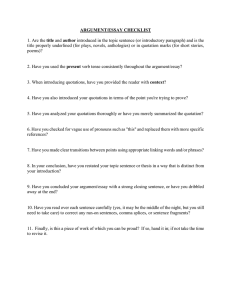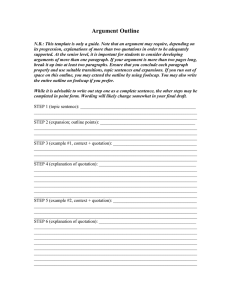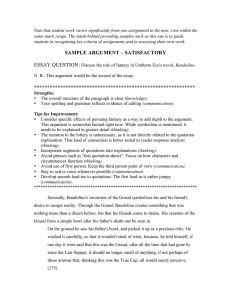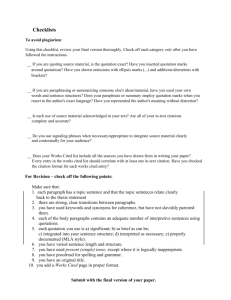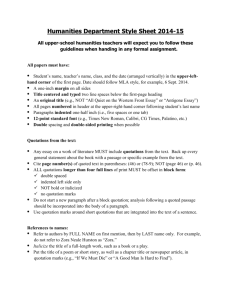1 There are common problems most students experience as they are... analytic essay. In fact, as most people begin to concentrate...
advertisement
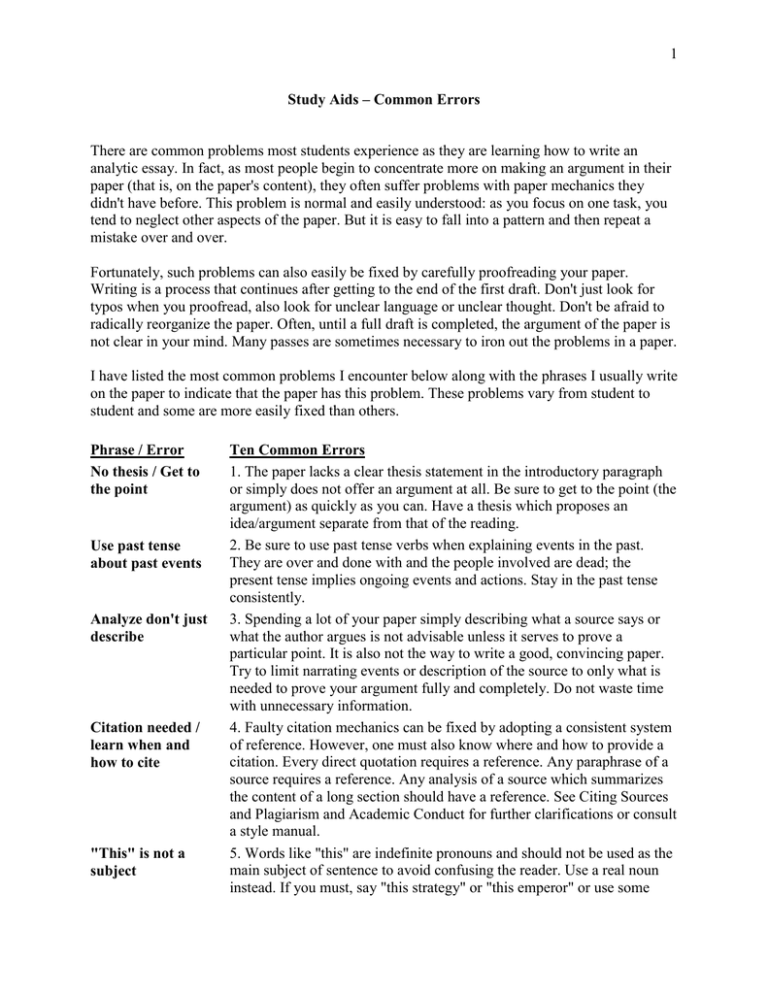
1 Study Aids – Common Errors There are common problems most students experience as they are learning how to write an analytic essay. In fact, as most people begin to concentrate more on making an argument in their paper (that is, on the paper's content), they often suffer problems with paper mechanics they didn't have before. This problem is normal and easily understood: as you focus on one task, you tend to neglect other aspects of the paper. But it is easy to fall into a pattern and then repeat a mistake over and over. Fortunately, such problems can also easily be fixed by carefully proofreading your paper. Writing is a process that continues after getting to the end of the first draft. Don't just look for typos when you proofread, also look for unclear language or unclear thought. Don't be afraid to radically reorganize the paper. Often, until a full draft is completed, the argument of the paper is not clear in your mind. Many passes are sometimes necessary to iron out the problems in a paper. I have listed the most common problems I encounter below along with the phrases I usually write on the paper to indicate that the paper has this problem. These problems vary from student to student and some are more easily fixed than others. Phrase / Error No thesis / Get to the point Use past tense about past events Analyze don't just describe Citation needed / learn when and how to cite "This" is not a subject Ten Common Errors 1. The paper lacks a clear thesis statement in the introductory paragraph or simply does not offer an argument at all. Be sure to get to the point (the argument) as quickly as you can. Have a thesis which proposes an idea/argument separate from that of the reading. 2. Be sure to use past tense verbs when explaining events in the past. They are over and done with and the people involved are dead; the present tense implies ongoing events and actions. Stay in the past tense consistently. 3. Spending a lot of your paper simply describing what a source says or what the author argues is not advisable unless it serves to prove a particular point. It is also not the way to write a good, convincing paper. Try to limit narrating events or description of the source to only what is needed to prove your argument fully and completely. Do not waste time with unnecessary information. 4. Faulty citation mechanics can be fixed by adopting a consistent system of reference. However, one must also know where and how to provide a citation. Every direct quotation requires a reference. Any paraphrase of a source requires a reference. Any analysis of a source which summarizes the content of a long section should have a reference. See Citing Sources and Plagiarism and Academic Conduct for further clarifications or consult a style manual. 5. Words like "this" are indefinite pronouns and should not be used as the main subject of sentence to avoid confusing the reader. Use a real noun instead. If you must, say "this strategy" or "this emperor" or use some 2 Phrase / Error (Too) Colloquial Quotation marks/ Block quotations Avoid using "I"/"you" Learn to use apostrophe/ it's ≠ its unclear wording/ wrong word/ awkward phrasing Ten Common Errors other noun to clarify what the subject is. In general, this problem results from writing too similarly to how one speaks (see next item). 6. Many inexperienced writers write as they speak in everyday life. This tendency often produces phrases or sentences that do not read well in formal writing, even though they may sound fine when read aloud. Avoid such "colloquial" expressions and replace them with more formal prose. For example, do not say "Augustus was doing his own thing...", say instead "Augustus had his own plan..." 7. The convention when quoting a source is to place the material in quotation marks if the material is three full lines or less. If it is more, the convention is to indent the quotation by half an inch on both sides and separate it from the text in a different single-spaced paragraph. Such longer quotations are not given quotation marks! Also, learn to use punctuation within quotations marks correctly. 8. Formal historical writing uses the third person voice, except on rare occasions. Avoid using "I" or "you" (the first and second person voices), except for strong emphasis of a personal opinion. 9. Possessive words ending in "s" take an apostrophe after the s and don't add another "s". For example: "Augustus' reign established the empire...". An exception is the word "its", which has no apostrophe (“it's “ = “it is” and is a contraction) 10. Something about the sentence (usually circled or underlined) either doesn't make sense, is so poorly worded as to be unclear, or simply is the wrong word for what you mean to say. If necessary, look up words in a dictionary to understand their meaning. This problem is worst when it occurs with verbs, which completely twists the meaning of the sentence.
